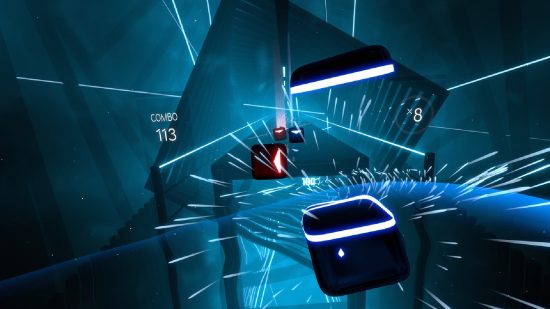Remember the times when we were told video games rot our brains? Well, now they’re helping develop them, at least according to a new study from Cognitive Science which shows spending time in Beat Saber and VR in general is a tool to “promote cognitive enhancement”.
The study focuses on a sub-genre of VR games known as exergaming. These games – like Beat Saber – put the body through a more rigorous experience, akin to a workout. Virtual reality gaming was put up against shadow boxing videos in the test with VR proving to have positive effects where the SBVs had none on the 11 “young participants”.
The exact parameters of the test saw the subjects partake in the tests for five consecutive days, with 15 minutes per day of play, followed by a one-month rest.
The test doesn’t name Beat Saber as the game, but refers to it as “VR training using a three-dimensional game where the aim is to cut moving cubes with a sword in each hand”. So, Beat Saber.
As for the results, the following is taken from the abstract of the study done by Cognitive Science:
“Before and after each training period, a battery of cognitive tests was performed to assess executive functions, such as attention (change blindness), reaction time, response inhibition (go/no-go, Stroop task), or flexibility (trail making test). Fine motor skills were also evaluated through a Fitt’s task. No effect of the SBV training was observed on any of the cognitive functions tested. On the contrary, a significant increased performance in selective attention and observation tests was found after VR training, as well as in inhibitory processes (Stroop and go/no-go).”
This suggests a really positive outcome for the VR training, and even more intriguing is the fact they used younger participants. VR is sometimes connotatively deemed bad for younger players without any significant data to support the claim. While we don’t know the ages of the participants involved, it’s enlightening to see such a positive outcome.
Does this mean that Beat Saber should be adopted by anyone looking to improve their cognitive abilities? No. What it does show, however, is that VR is about more than just gaming, and there are some genuine development opportunities to be uncovered should it be adopted by educational or medical studies in the future.

While we can’t be sure which VR headset was used, the Meta Quest 3 certainly seems like a reasonable assumption to make for its portability and performance.
